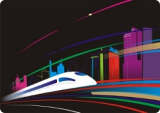
Transport Overview n° 48
Overview n°48 by Christine Raynard, Department of Sustainable Development (DDD)
By late 2012, it will set up a system of bonus / penalty depending on the noise in rail freight.
Wagons fitted new brake blocks composite materials developed by DB, will receive a bonus, while the others are accused of a penalty. These rewards and penalties will be charged directly to the car owner. This system will be funded by a grant from the federal government for eight years, then it will be powered equally by the rail industry and government.
The noise level in the brake is at 98 decibels and this material would be reduced to about 10 decibels.
In the period 2012-2020, the Department estimates that 180,000 cars and could be renovated at a cost of 300 million euros.
2) In June 2012, thanks to the double tunnel Diabolo and construction of a new line, Brussels Airport will be opened up and become a through-station. It will link the north, as well as major European cities.
The Belgian railways (SNCB) and should Thalys trains on the new route. The German operator Deutsche Bahn is also interested with ICE. Cons by Eurostar would not meet certain technical criteria.
This project is a double technical prowess since the tunnel was dug under the airport and its runways and takeoff, while allowing it remains fully operational during five years of work. The second achievement of the project is the installation of a railway line in the middle of the highway. This new line of ten kilometers between Schaerbeek and Mechelen required the construction of two viaducts and adaptation of seven bridges. The trains will be able to travel at 160 km / h.
The entire project, and new tunnel line represent an investment of 540 million euros and has a European aid. The new line is funded by the Belgian infrastructure manager, and Infrabel the tunnel by the consortium Northern Diabolo NV through a public-private partnership.
After completion, Northern Diabolo will get the concession of the infrastructure for a period 35 years and will provide Infrabel during this period. The consortium will collect a surcharge per ticket sold to cover his financial investment. At the end of the period of 35 years, the infrastructure will automatically become the property of Infrabel.
3) The Belgian railways (SNCB) have tried for three months, eight people (two usually have a company car and six commuters), a bundled solution for mobility: an electric car, a rail pass and a subscription carsharing (Cambio) to 200 euros per month. These eight people have benefited from three months to travel free.
This test proved instructive, but in line with perceived ideas. The electric car has been used for short distances in urban areas because it raises concerns about battery life, for journeys on motorways, at night with lights, air conditioning use ... The reload time also poses a problem. Some people have expressed interest in a more light as the electric bicycle. For car sharing, critics have focused on the obligation to book and bring the car to the starting point. As for the train, its advantages are freedom of rest, work and leisure it offers, but with constraints of limited frequency and time of the last train.
But the general observation concerns the fact that users have done more miles than usual, even though the total energy balance appears below. Thus, the more supply increases, consumption increases more.
4) According to calculations by the International Public Transport Union, the Swiss have kept their title in 2010 world championship of train travel, with an average of 2,248 miles per year per capita.
They are followed by Japan (1910 km per year), followed far behind by the Danes (1322 km), French (1320 km) and Austria (1227 km).
For against the Japanese are ahead in number of uses, since they took the train 69 times per year, considerably more than once a week, the Swiss 50 times, 36 times the Luxembourgers, Danes 35 times, while the French came in ninth with only 17 train trips, the Lithuanians are the last in the standings with one trip per year.
Press Contact :
Jean-Michel Roullé,
Head of Communications
Tel. +33 (0) 1 42 75 61 37
jean-michel.roulle@strategie.gouv.fr

